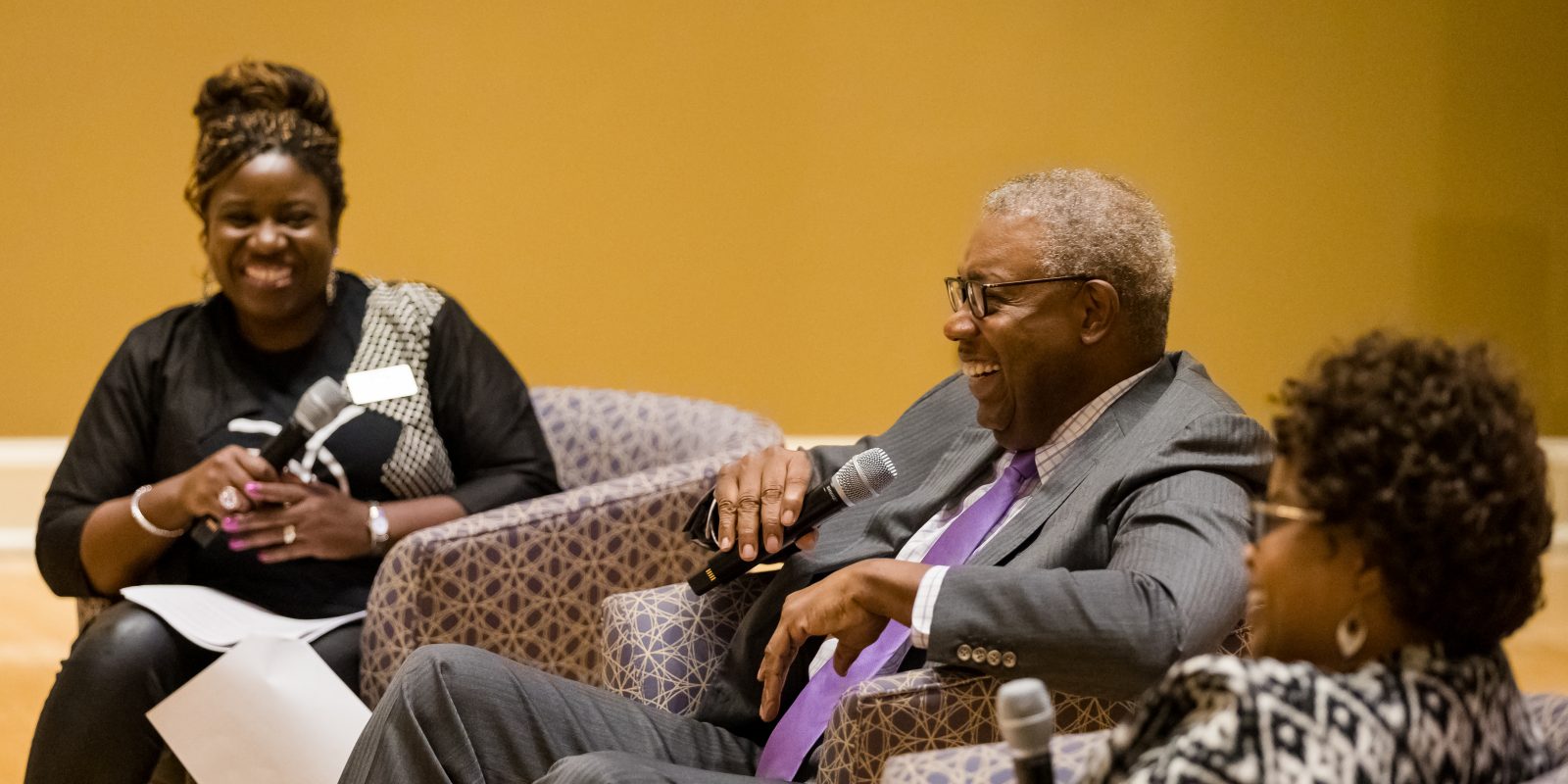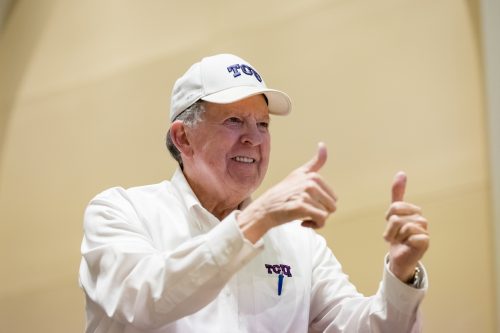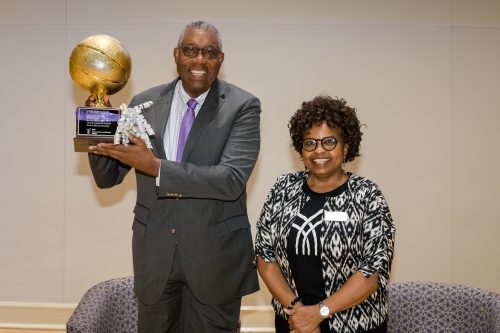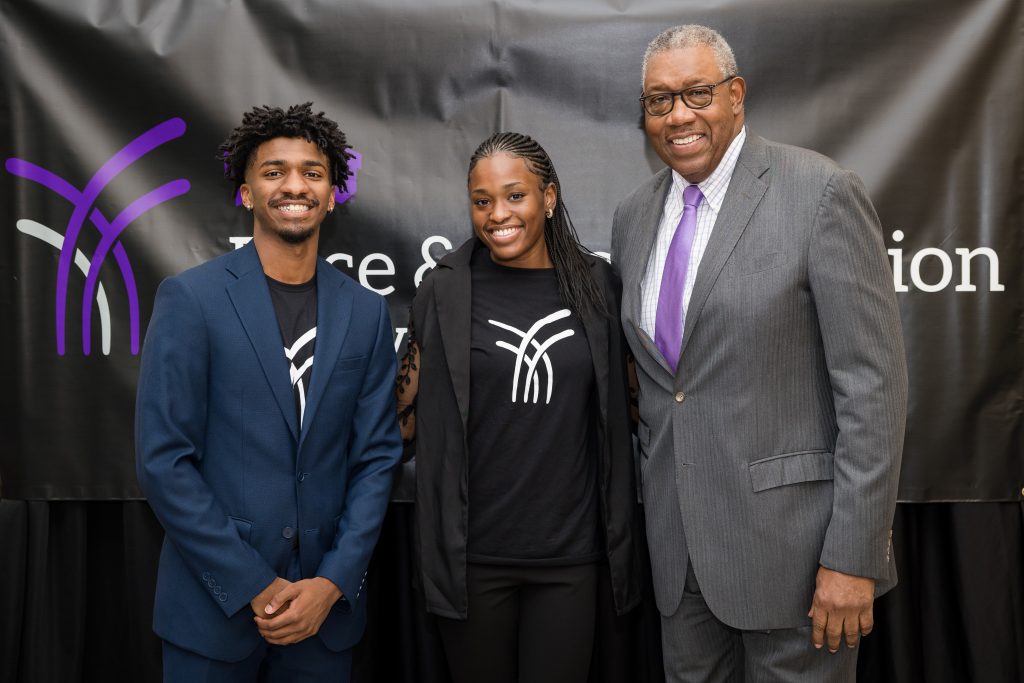
James Cash fielded questions from leaders in TCU's Race & Reconciliation Initiative.
Giving Back and Leading On
James Cash, TCU’s first Black student athlete, returned to campus to speak about the power of education and creating opportunities for others to succeed.
James Cash ’69 said his education and support system enabled his lifelong success. He was the first Black student athlete at TCU; later, he became the first Black professor at Harvard to attain tenure and a board member at major corporations including General Electric and WalMart. He also served on TCU’s Board of Trustees.
Cash spoke with Amiso George, professor of strategic communication and chair of TCU’s Race and Reconciliation Initiative, and Sylviane Greensword, postdoctoral fellow with the Race and Reconciliation Initiative, in a panel discussion Thursday at the Brown-Lupton University Auditorium. Friends and family filled the audience, including classmates and current students from I.M. Terrell High School.
The panel coincided with the unveiling of Cash’s statue outside the Ed and Rae Schollmeier Arena on Friday. The statue will be the first of a Black person on campus, George said to thunderous applause.
Breaking barriers at TCU
In 1964, Cash needed to choose which Southwest Conference school he would integrate. He said he wanted a place where he could feel comfortable and supported.

Because Garvin Isaacs was willing to break the color barrier in a Fort Worth gym in the 1960s, he and James Cash ended up playing together for TCU Basketball. They became lifelong friends, even participating on each other’s weddings.
One person was instrumental in his decision: Garvin Isaacs ’67, then a first-year guard on the TCU basketball team, who ignored segregation barriers at Cash’s local gym and became a lifelong friend. Having a trustworthy friend in Isaacs made TCU the best choice, Cash said.
Cash spoke highly of his time at TCU and said most people were welcoming. During his second day on campus, All-American defensive back Frank Horak ’67 sought Cash out and said, “I’m delighted that you are here.” Horak told Cash to find him if he experienced issues on campus.
But Cash did endure harmful language from white classmates who had never been exposed to a Black person.
When Cash first met with an academic counselor about majoring in mathematics, he was asked if he was certain because “you people aren’t good” at math.
After the same faculty member saw Cash shine in the classroom, he became one of Cash’s biggest advocates, making sure he received assignments while the team traveled. “He became what would be known today as an ally,” Cash said. “It taught me a lesson … there are many perceptions that can be really reversed once people are exposed.”
A change is gonna come
Cash connected stories of his TCU experience to the wider Civil Rights era. In March 1965, John Lewis led a march in Selma, Alabama, on what became known as Bloody Sunday. TCU awarded Cash an athletic scholarship in May 1965.
Nearly 60 years later, Cash said, the university’s commitment to inclusion remains “one of the reasons I hold this institution in such high regard.”

TCU unveiled a statue of Cash on Friday, November 11, 2022. The day before, he was given a basketball by Amiso George, professor of strategic communication and chair of TCU’s Race and Reconciliation Initiative.
Recent events have influenced Cash’s decisions to speak publicly about his life experience and accept honors from the institutions he has served. Before the death of George Floyd, Cash said, “Candidly, I wouldn’t have accepted” the statue from TCU.
“I thought [justice] was about doing the work,” he said.
Since June 2020, Cash has changed his mindset — being in the spotlight could promote positive representation and prevent history from repeating itself.
In April 2022, he attended the dedication of Harvard Business School’s Cash House, renamed in his honor.
Cash, who praised his education at I.M. Terrell High School, has devoted his resources to creating educational opportunities for underrepresented and marginalized students.
At Terrell, his teachers and classmates created a supportive environment where students reached for excellence. However, many underrepresented students post-desegregation have been placed in environments with few resources or expectations, he said. “They seem to have lost the ability to dream.”
As a business leader and entrepreneur, Cash has seized the opportunity to make a difference for young people, especially Black men.
Cash touted the “Baby College” program of the community nonprofit Harlem Children’s Zone, where he served as a board member for 10 years. The program educates caregivers about child development to promote healthy childhood stimulation. “It really affects their capacity to learn at later stages of life,” he said.
Inspiration also came closer to home: Cash wasn’t the only member of his family with a TCU degree. “My mother set the standard for pursing excellence,” he said.
In the 1950s, Black students could not enroll at TCU, but faculty in the College of Education led by Sandy Wall broke cultural barriers to teach courses off campus to as many as 60 Black people.
Juanita Cash, a Fort Worth schoolteacher, earned a master’s in education from TCU in the summer of 1965.
In 1987, Cash and his sister, Pamela, established the Juanita Cash Fellowship for Graduate Education with the TCU College of Education to help teachers from diverse backgrounds and educational settings pursue graduate degrees.
Current student athletes Darius Ford of the men’s basketball team and Tomi Taiwo of the women’s team also spoke with Cash and fielded questions from the audience.
Ford asked if TCU basketball would win the national championship with Cash on the roster. His answer? “I would absolutely say yes, but it would be because I’d be holding all you guys accountable.”
It takes a village
Cash’s family, classmates and teammates from I.M. Terrell received ovations and watched as Cash received an award from TCU’s Race and Reconciliation Initiative that praised him as “A leader on the court, in the classroom, on the boards and in the community.”
Earlier in his lifetime, they could not have stepped foot on campus. “It’s surreal,” Cash said.
He hopes people who see the statue connect with his experiences as a Black person, student athlete and alumnus who has worked to leave a meaningful, transformative legacy.
While structural racism persists, Cash said improvements give reason for hope. “We are in a much better place, even with all the challenges we can talk about, in 2022 than we were in 1969.”

Current TCU student athletes Darius Ford, left, of men’s basketball and Tomi Taiwo of the women’s team also interviewed Cash and fielded questions from the audience.

Your comments are welcome
Comments
Related reading:
Sports: Riff Ram
First Person with… Kenrich Williams
From wounded to winner, the NIT standout is ready to succeed in his senior season with TCU men’s basketball.
Campus News: Alma Matters, Letters
Chancellor: We’re at a Crossroads of Racial Equity and Justice
Every day is an opportunity to learn from the past. As students, scholars and citizens of the world, we know history maintains a strong pull on the present.